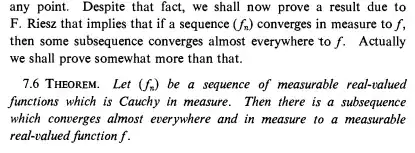Why in the theorem taken a Cauchy in measure sequence and not any sequence that converges in measure? Before state the theorem, the text says "we shall now prove a result due to F. Riesz that implies that if a sequence $(f_n)$ converges in measure to $f$, then some subsequence converges almost everywhere to $f$". Every convergent sequence in measure is cauchy in measure? Otherwise, I do not see how this theorem justifies the fact that in reality for any sequence of functions convergent in measure there is a subsequence that converges almost everywhere.
I saw that to prove this statement it is not even necessary for the sequence to be Cauchy in measure, as shown here.
I would be very grateful if you clarify my doubt.
